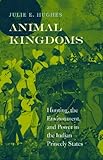Animal kingdoms : hunting, the environment, and power in the Indian princely states / Julie E. Hughes.
Material type: TextPublication details: Cambridge, Massachusetts : Harvard University Press, (c)2013.Edition: first Harvard University Press editionDescription: 1 online resourceContent type:
TextPublication details: Cambridge, Massachusetts : Harvard University Press, (c)2013.Edition: first Harvard University Press editionDescription: 1 online resourceContent type: - text
- computer
- online resource
- 9780674074781
- SK235 .A556 2013
- COPYRIGHT NOT covered - Click this link to request copyright permission: https://lib.ciu.edu/copyright-request-form
| Item type | Current library | Collection | Call number | URL | Status | Date due | Barcode | |
|---|---|---|---|---|---|---|---|---|
 Online Book (LOGIN USING YOUR MY CIU LOGIN AND PASSWORD)
Online Book (LOGIN USING YOUR MY CIU LOGIN AND PASSWORD)
|
G. Allen Fleece Library ONLINE | Non-fiction | SK235 (Browse shelf(Opens below)) | Link to resource | Available | ocn828868964 |
Includes bibliographies and index.
Introduction : a leopard in the garden -- Princely sport and good tiger grounds -- Exceptional game in powerful places -- Controlling environments for progressive sport -- Martial pasts and combative presents -- Threatened kingdoms of dwindling beasts -- Conclusion : leaving the garden.
Animal Kingdoms reveals the far-reaching cultural, political, and environmental importance of hunting in colonial India. Julie E. Hughes explores how Indian princes relied on their prowess as hunters of prized game to advance personal status, solidify power, and establish links with the historic battlefields and legendary deeds of their ancestors.
One summer evening in 1918, a leopard wandered into the gardens of an Indian palace. Roused by the alarms of servants, the prince's eldest son and his entourage rode elephant-back to find and shoot the intruder. An exciting but insignificant vignette of life under the British Raj, we may think. Yet to the participants, the hunt was laden with symbolism. Carefully choreographed according to royal protocols, recorded by scribes and commemorated by court artists, it was a potent display of regal dominion over men and beasts alike. Animal Kingdoms uncovers the far-reaching cultural, political, and environmental importance of hunting in colonial India. Julie E. Hughes explores how Indian princes relied on their prowess as hunters to advance personal status and solidify power. Believing that men and animals developed similar characteristics by inhabiting a shared environment, they sought out quarry--fierce tigers, agile boar--with traits they hoped to cultivate in themselves. Largely debarred from military activities under the British, they also used the hunt to establish meaningful links with the historic battlefields and legendary deeds of their ancestors. Hunting was not only a means of displaying masculinity and heroism, however. Indian rulers strove to present a picture of privileged ease, perched in luxuriously outfitted shooting boxes and accompanied by lavish retinues. Their interest in being sumptuously sovereign was crucial to elevating the prestige of prized game. Animal Kingdoms will inform historians of the subcontinent with new perspectives and captivate readers with descriptions of its magnificent landscapes and wildlife.
COPYRIGHT NOT covered - Click this link to request copyright permission:
There are no comments on this title.
